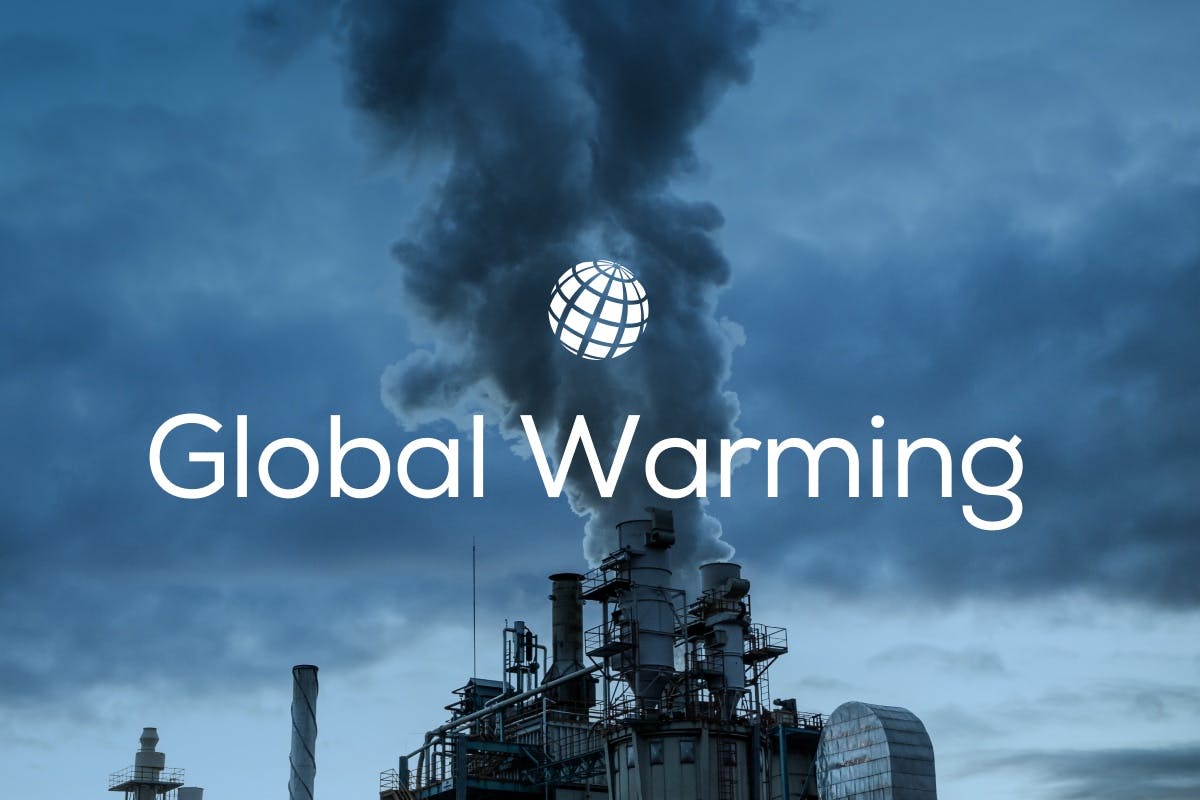Global temperatures were higher than ever in 2024. Multiple agencies and organizations found that the average global temperature exceeded 1.5 degrees Celsius, one of the main targets set by the Paris Climate Agreement.
Increasing global temperatures are largely thanks to increasing levels of carbon dioxide and other greenhouse gases in the atmosphere. Greenhouse gases reached those problematic levels because of all the fossil fuels burned since the Industrial Revolution.
While the dangers and causes of climate change are well-known, so are the solutions. Here’s what you need to know.
See how much you can save with home energy changes
Global Warming Definition
At Palmetto, we define global warming as follows:
Global warming is a gradual, long-term increase in the average temperature of Earth's atmosphere due to the greenhouse effect where gasses from various human activities, including the burning of fossil fuels, trap heat from solar radiation.
A vast majority of scientists worldwide agree that global warming is very real and, if left unaddressed, could result in devastating effects for humanity. More than 99% of peer-reviewed scientific research acknowledges that humans are the major cause of this problem.
Causes of Global Warming
Global warming comes from the over-accumulation of greenhouse gasses (GHGs) such as carbon dioxide (CO2), nitrous oxide (N2O), and methane (CH4) in the Earth's atmosphere. The excess greenhouse gasses can come from a variety of sources, though most involve burning fossil fuels in some way:
- Electricity generation: Burning coal, natural gas or other fossil fuels to generate electricity accounts for about a quarter of greenhouse gas emissions in the US, the EPA estimates.
- Transportation: Burning fuel to move people and goods is one of the largest sources of GHGs in the US.
- Buildings: Fossil fuels burned to heat buildings and refrigerants that leak out of cooling systems are major sources of GHGs in buildings.
- Deforestation: Deforestation removes the trees that act as a natural GHG filter, absorbing carbon dioxide and releasing oxygen into our atmosphere.
- Agricultural Practices: Modern farming accounts for more than 10% of all human-produced greenhouse gas emissions, largely due to livestock and rice cultivation.
- Consumer goods: The energy used in the manufacturing and transportation of consumer goods leads to increased greenhouse gas emissions.
- Mining: Operations that rely on fossil fuels emit significant levels of GHGs.
- Waste disposal: When plastics and other non-biodegradable waste decompose, it releases toxic gasses into the environment and the potent GHG methane.

Credit: NOAA
Effects of Global Warming
A scientific report published by the United Nations Intergovernmental Panel on Climate Change (IPCC) outlines the serious effects of global warming and global climate change as follows.
- Higher temperatures: The average temperature on the Earth has increased by 1.5 degrees Celsius (2.7 degrees Fahrenheit) since 1900, and scientists predict that this trend will continue.
- Rising sea level: Sea levels along the United States coastline are projected to rise between 10 and 12 inches by 2050, which could destroy islands and coastal cities and ecosystems.
- Extreme weather events: Global warming has been linked to an increase in extreme weather events, such as floods, tornadoes, and hurricanes, which can cause deaths, famine, and disease. There have been more weather events that cause $1 billion in damage in recent years, according to NOAA.
- Plant and animal extinction: Rising global temperatures can cause parts of the planet to become uninhabitable for many native plant and animal species.
- Ocean acidification: Because of escalating carbon dioxide emissions, oceans are becoming more acidic and harmful to marine life.
- Dirtier air: Hotter temperatures lead to more smog, which can trigger respiratory problems and aggravate existing health conditions.
- Disappearing polar ice: When the water frozen in polar sea ice melts into the oceans, it can have a huge impact on rising sea levels and speed up the heating of Earth’s atmosphere.
The Role of Renewable Energy in Addressing Global Warming
Renewable, carbon-free electricity won’t address every source of GHGs, but it will cover a huge chunk.
Electricity generation accounted for 25% of all greenhouse gas emissions in the US in 2022. At the same time, demand for electricity is rising with new, power-hungry data centers being built. That demand will grow more as more furnaces get swapped out for heat pumps and electric vehicles replace gas-powered ones.
Renewable energy, like solar, wind and hydroelectric, can help emissions even as demand for electricity increases.
See how much you can save with home energy changes
Global Warming vs Climate Change
While some people use global warming and climate change interchangeably, they are technically two different terms that describe weather and climate and warrant their own definitions.
- Global warming is the rise in the temperature of the Earth's atmosphere.
- Climate change is the suite of changes brought on by the rise in temperatures.
- Both are spurred on by the rising levels of greenhouse gases in the atmosphere from burning fossil fuels, deforestation, and other causes
How to Stop Global Warming
Addressing global warming will take large-scale changes that are beyond what any one person can control. However, there’s plenty that individuals can do to reduce their contribution to the problem, from adopting simple lifestyle changes to using green energy.
- Use renewable energy: Using solar power, wind power, or other alternative energy sources can reduce your carbon footprint (and may lower your electricity bill).
- Use less power: Turn off lights and unplug appliances when they're not in use.
- Opt for sustainable transportation: Walk, bike, carpool, invest in an electric vehicle, or switch your daily commute to public transportation instead of driving a vehicle solo.
- Change your diet: Diets heavy in meat and animal products typically produce more greenhouse gasses than those rich in vegetables, nuts, and beans.
- Recycle: Ensure that all waste materials, including paper, plastics, aluminum, and glass, are sent to your local recycling center or composted whenever possible.
- Support the groups taking climate actions: Joining with others can amplify your donations or actions, whether that’s to advocate for positive change in your community, elect leaders who will address the issue or help people adapt to a warmer world.

Credit: IPCC
Global Warming and Your Environmental Impact
Our world is heating up. Because of global warming, temperatures are increasing and extreme weather is becoming more common. If we don't take preventative action now, future generations will be faced with warmer temperatures, as well as higher sea levels, extreme weather events, crop failures, extinctions, and other devastating effects.
You can help limit the impacts of global warming by reducing greenhouse gas emissions, cutting down on your energy consumption, and shifting away from fossil fuels. Better still, plant trees around your neighborhood, and join a movement that voices support for clean energy sources.
Solar energy is one of the cleanest and most sustainable ways to power your home, as the energy produced doesn’t generate any greenhouse gasses. Installing a solar panel system on your home has the added benefit of helping to lower your utility bills.
Are you ready to help save the environment from the effects of global warming by going solar? Get started today with Palmetto. Check out our free Solar Design and Savings Estimate Tool to see how much you could save with solar panels, including an estimate of your personal environmental impact.
Frequently Asked Questions
What is a simple definition of global warming?
Global warming is the gradual increase in global temperatures due to human activities like burning fossil fuels.
What is the main cause of global warming?
Global warming is largely driven by the use of fossil fuels for energy, though agriculture, land use, and other factors play a role.
What can I do to address global warming?
Avoiding the worst effects of climate change will require governments, companies, and international coalitions to take action, but individual actions in your home can help. Installing solar panels, electrifying your home, and swapping your gas-powered car for an electric one are valuable steps. Smaller actions that conserve energy, like switching off lights and using less hot water add up. Reducing the amount of meat you eat and changing how you travel can make a difference too.
See what home electrification can do for you:
 Andrew BlokWriter and Editor
Andrew BlokWriter and EditorAndrew has worked as a journalist and writer for four years, over half of those dedicated to covering solar. He currently lives in Tucson, AZ, where you might run into him walking his dog and birding while dodging the heat. He has degrees in English education and journalism.

